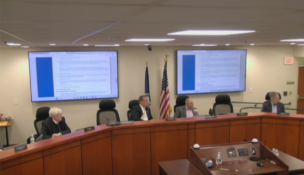As data centers grow, Amazon and Dominion explore small nuclear reactors
Energy-hungry data centers, AI drive agreement

L to R: U.S. Sen. Tim Kaine, U.S. Energy Secretary Jennifer Granholm, Amazon Web Services CEO Matt Garman, U.S. Sen. Mark Warner and Gov. Glenn Youngkin attend a nuclear energy announcement at Amazon.com HQ2 in Arlington County on Oct. 16, 2024. Photo courtesy Amazon

L to R: U.S. Sen. Tim Kaine, U.S. Energy Secretary Jennifer Granholm, Amazon Web Services CEO Matt Garman, U.S. Sen. Mark Warner and Gov. Glenn Youngkin attend a nuclear energy announcement at Amazon.com HQ2 in Arlington County on Oct. 16, 2024. Photo courtesy Amazon
As data centers grow, Amazon and Dominion explore small nuclear reactors
Energy-hungry data centers, AI drive agreement
With power consumption by data centers and AI projected to more than quadruple in Virginia in the next 15 years, Amazon.com and Dominion Energy Virginia have entered into an agreement to explore potential development of small modular nuclear reactors at North Anna Power Plant in Louisa County, the two companies announced at an event Wednesday at Amazon‘s HQ2 East Coast headquarters in Arlington County.
Dominion and Amazon’s memorandum of understanding means the companies will “jointly explore innovative ways to advance SMR development and financing while also mitigating potential cost and development risks for customers and capital providers,” according to Dominion’s announcement.
“This is a milestone along the path,” Amazon Web Services CEO Matt Garman said at Wednesday’s event. “There’s a ton that we need to do between here and there, and there’s a lot of work that needs to go into this, but this is a really important milestone that we’re celebrating today.”
At Wednesday morning’s event, Gov. Glenn Youngkin, U.S. Sens. Tim Kaine and Mark Warner and Dominion Energy Virginia President Ed Baine were on hand, among other state and national dignitaries.
“I am thrilled that Virginia is among the first states to take this big step,” Youngkin said. “Just two-and-a-half years ago, Virginia was literally accelerating on what has been an uninterrupted renaissance in growth, job growth and investment by companies who’ve committed $83 billion to expand or come to Virginia, and hire more people than we’ve ever had working before in the history of the commonwealth.”
He noted that the state is “poised to take this giant step with our partners,” as home to the nuclear Navy, multiple research universities and Dominion.
In his comments, Kaine also mentioned Lynchburg-based nuclear fuel producer BWX Technologies and Framatome Inc., the North American subsidiary of the French nuclear equipment, services and fuel producer, as other significant players in Virginia’s nuclear energy sector. “Amazon is the largest power user in the United States,” Kaine said. “That AWS is here, and that AWS is endeavoring to help us advance our innovation together with these other innovators in Virginia makes perfect sense.”
As of now, only two SMRs are in operation — one in Russia and the other in China — and Virginia likely won’t have its own SMR before the mid-2030s.
Warner, who chairs the Senate’s Select Committee on Intelligence, said Wednesday that energy innovation is important also as a matter of national security, particularly as the U.S. races to catch up with China’s innovations. “National security is not simply the nation state that has the most tanks and guns and ships and planes, but increasingly, it’s going to be who can win the battle in technology competition.” China, he added, is constructing “30 nuclear plants even as we speak. They have a goal of adding 150 more by 2035.”
However, he said, Virginia is “the nuclear capital for the country,” with 100,000 people already working in the nuclear sector in the commonwealth, including sailors, university researchers and employees at BWXT, Framatome, Huntington Ingalls Industries and other companies.
Ambitious plans
Amazon’s agreement with Dominion was just part of its news Wednesday, as the global e-tail giant announced it has signed three agreements to support development of small modular reactors, or SMRs, including one in the state of Washington with Energy Northwest, to develop four advanced SMRs. According to Amazon’s announcement, the four reactors would generate roughly 960 megawatts of electricity at full operation, beginning in the early 2030s. Amazon, which in March acquired a nuclear-powered data center campus in Pennsylvania from Talen Energy, also has committed to invest in SMR developer X-energy, whose reactor design will be used in the Energy Northwest project.
“Nuclear is a safe source of carbon-free energy that can help power our operations and meet the growing demands of our customers, while helping us progress toward our Climate Pledge commitment to be net-zero carbon across our operation by 2040,” Garman said in a statement released Wednesday morning.
Dominion previously announced in July that it had issued a request for proposals to evaluate the feasibility for a small nuclear reactor to be developed at its North Anna power plant, where it has two conventional, large nuclear reactors. Nuclear technology companies received the RFP, which was not a guarantee to build an SMR but would be the first step in exploring whether such a step was feasible, the Fortune 500 utility said in July.
On Wednesday, Dominion Energy Virginia’s Baine said that the “site is well on its way to be able to be developed,” and that he expects Dominion to make a decision on the winning proposal before the end of the year. He also said that X-energy is among the companies that have submitted a proposal.
The RFP, Baine added, will “inform us how we want to move forward with companies for additional small modular reactors as well.”
Virginia Secretary of Commerce and Trade Caren Merrick said Wednesday that she expects Youngkin to soon issue an executive order about accelerating permitting for nuclear sites, and the state has invited X-energy to come to Virginia for manufacturing.
Competitor Google preempted Amazon’s announcement by a day, announcing on Tuesday that the tech company had reached an agreement with Kairos Power to develop and purchase 500 megawatts of power from six to seven SMRs, planned to come online between 2030 and 2035. And in September, Microsoft forged a deal with Constellation Energy to offset power consumption by its data centers by reviving a portion of the Three Mile Island power plant, the Pennsylvania facility that in 1979 experienced a partial nuclear meltdown, the worst nuclear disaster in U.S. history.
Moving toward nuclear in Va.
Over the past couple of years, SMRs have been a big part of Virginia’s energy conversation, especially as data center growth has put more demands on the state’s power grid.
According to Dominion’s Integrated Resource Plan, filed Tuesday with the Virginia State Corporation Commission and the North Carolina Utilities Commission, power demand in Dominion’s coverage area in Virginia and North Carolina is expected to grow 5.5% annually over the next decade and double by 2039. Dominion has previously predicted that the data center industry in the state will demand 13 gigawatts of electricity by 2038, nearly five times the 2.8 gigawatts it used in 2023.
In Virginia, Amazon has agreed to explore the development of an SMR project near North Anna, bringing “at least 300 megawatts of power to the Virginia region, where Dominion projects that power demands will increase by 85% over the next 15 years,” according to Amazon’s news release. Additionally, Amazon signed an agreement to place a new data center next to a nuclear facility in Pennsylvania, a carbon-free energy source to power the data center.
In Loudoun County’s Ashburn area, where more than 70% of the world’s internet traffic courses through a corridor known as Data Center Alley, Amazon Web Services is the biggest fish in a gigantic pool. From 2011 to 2021, AWS invested more than $51.9 billion in Virginia, including building data centers. In January 2023, the company had at least 65 data centers in Loudoun in operation or under development, out of more than 200 data centers in the county, and AWS announced it planned to invest $35 billion by 2040 to build more data center campuses across the state.
Nationally, it’s anticipated that data centers will account for 17% of energy usage nationwide by 2030, according to a Bloomberg Intelligence report. That’s up from 4% in 2022 and 6% in 2026, according to data and projections from the International Energy Agency.
U.S. Secretary of Energy Jennifer Granholm, speaking at Wednesday’s event, called Virginia “the go-to place for the concentration of data centers,” and noted that AWS is the latest company to do “BYOP,” or “bring your own power” for data centers. “And this is the important piece I mentioned, that the technology companies know that in order for these data centers to achieve great community buy-in, bringing their own power with them is an important piece of that, so the rates are not raised on everyday citizens.”
She added that the Department of Energy is announcing $900 million in funding “for those who want to deploy even more … small modular reactors,” referring to applications opening for a program to support the first commercial-use SMR in the United States.
In the past couple of years, as artificial intelligence usage and overall digital use has grown, so has demand on Virginia’s power supply. In a May earnings call, Dominion Energy CEO Bob Blue said that the utility is receiving more requests to power larger data center campuses with larger energy demands of 60 to 90 megawatts per building, or several gigawatts for multibuilding campuses.
Baine said in an interview Wednesday that “there are a number of things that are driving energy demand within Virginia. Data centers [are] absolutely one of the big ones, but there’s also manufacturer electrification that is also increasing demand.”
The Joint Legislative Audit and Review Commission (JLARC) is conducting a study on data centers as some state legislators are pushing for high-volume power users to cover infrastructure costs to keep the state’s power grid reliable. The Virginia General Assembly forwarded all data center-related bills to 2025’s session so lawmakers could take JLARC’s study — expected to be released in November — into consideration.
Virginia Business Editor Richard Foster and Deputy Editor Kate Andrews contributed to this story.
t

















